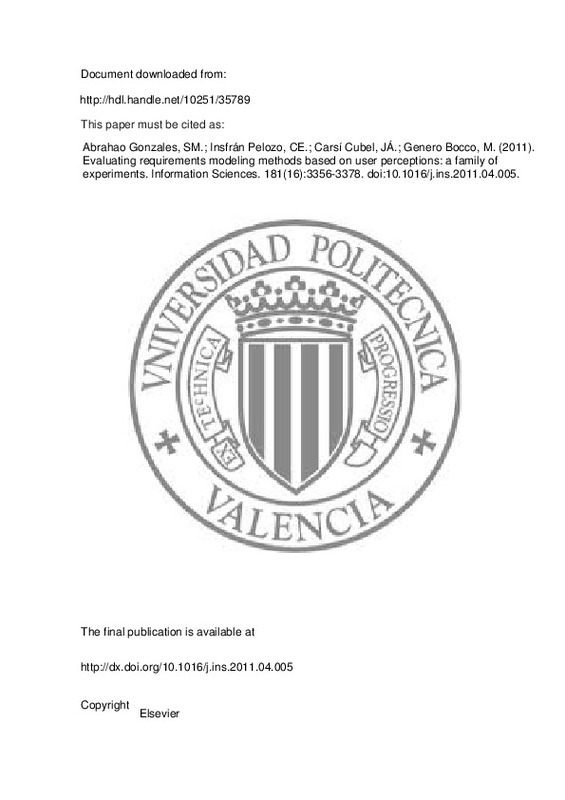Abrahao Gonzales, SM.; Insfrán Pelozo, CE.; Carsí Cubel, JÁ.; Genero Bocco, M. (2011). Evaluating requirements modeling methods based on user perceptions: a family of experiments. Information Sciences. 181(16):3356-3378. https://doi.org/10.1016/j.ins.2011.04.005
Por favor, use este identificador para citar o enlazar este ítem: http://hdl.handle.net/10251/35789
|
Título:
|
Evaluating requirements modeling methods based on user perceptions: a family of experiments
|
|
Autor:
|

 Abrahao Gonzales, Silvia Mara
Abrahao Gonzales, Silvia Mara

 Insfrán Pelozo, César Emilio
Insfrán Pelozo, César Emilio

 Carsí Cubel, José Ángel
Genero Bocco, Marcela
Carsí Cubel, José Ángel
Genero Bocco, Marcela
|
|
Entidad UPV:
|
Universitat Politècnica de València. Departamento de Sistemas Informáticos y Computación - Departament de Sistemes Informàtics i Computació
|
|
Fecha difusión:
|
|
|
Resumen:
|
Numerous methods and techniques have been proposed for requirements modeling, although very few have had widespread use in practice. One drawback of requirements modeling methods is that they lack proper empirical evaluations. ...[+]
Numerous methods and techniques have been proposed for requirements modeling, although very few have had widespread use in practice. One drawback of requirements modeling methods is that they lack proper empirical evaluations. This means that there is a need for evaluation methods that consider both the theoretical and practical aspects of this type of methods and techniques. In this paper, we present a method for evaluating the quality of requirements modeling methods based on user perceptions. The evaluation method consists of a theoretical model that explains the relevant dimensions of quality for requirements modeling methods, along with a practical instrument with which to measure these quality dimensions. Basically, it allows us to predict the acceptance of a particular requirements modeling method in practice, based on the effort of applying the method, the quality of the requirements artifacts produced, and the user perceptions with regard to the quality of the method. The paper also presents an empirical test of the proposed method for evaluating a Rational Unified Process (RUP) extension for requirements modeling. That test was carried out through a family of experiments conducted with students and practitioners and provides evidence of the usefulness of the evaluation method proposed. © 2011 Elsevier Inc. All rights reserved.
[-]
|
|
Palabras clave:
|
Controlled experiment
,
Method evaluation
,
Requirements modeling
,
RUP
,
Theoretical models
,
Experiments
|
|
Derechos de uso:
|
Reserva de todos los derechos
|
|
Fuente:
|
Information Sciences. (issn:
0020-0255
)
|
|
DOI:
|
10.1016/j.ins.2011.04.005
|
|
Editorial:
|
Elsevier
|
|
Versión del editor:
|
http://dx.doi.org/10.1016/j.ins.2011.04.005
|
|
Código del Proyecto:
|
info:eu-repo/grantAgreement/MICINN//TRA2009_0074/ES/Entorno para la Evaluación Continua de la Calidad de artefactOs sOftware/ /
...[+]
info:eu-repo/grantAgreement/MICINN//TRA2009_0074/ES/Entorno para la Evaluación Continua de la Calidad de artefactOs sOftware/ /
info:eu-repo/grantAgreement/JCCM//PII2109-0075-8394/
info:eu-repo/grantAgreement/MICINN//IDI-20090557/ES/MEJORA Y EVALUACIÓN DEL DISEÑO, USABILIDAD, SEGURIDAD Y MANTENIBILIDAD DEL SOFTWARE (1%2F4)/
info:eu-repo/grantAgreement/MICINN//TIN2009-13718-C02-01/ES/Mejora Avanzada De Procesos Software Globales/
info:eu-repo/grantAgreement/JCCM//PEII11-0330-4414/
info:eu-repo/grantAgreement/MICINN//IDI-2010043(1-5)/ES/ORIGIN/
info:eu-repo/grantAgreement/MICINN//TIN2009-13838/ES/Multimodeling Approach For Quality-Aware Software Product Lines/
[-]
|
|
Agradecimientos:
|
This research has been funded by the following projects: MULTIPLE (MICINN TIN2009-13838), MEDUSAS (CDTI-MICINN and FEDER IDI-20090557), ORIGIN (CDTI-MICINN and FEDER IDI-2010043(1-5)), PEGASO/MAGO (MICINN and FEDER, ...[+]
This research has been funded by the following projects: MULTIPLE (MICINN TIN2009-13838), MEDUSAS (CDTI-MICINN and FEDER IDI-20090557), ORIGIN (CDTI-MICINN and FEDER IDI-2010043(1-5)), PEGASO/MAGO (MICINN and FEDER, TIN2009-13718-C02-01), EECCOO (MICINN TRA2009_0074), MECCA (JCMM PII2109-0075-8394) and IMPACTUM (JCCM PEII11-0330-4414).
[-]
|
|
Tipo:
|
Artículo
|







![[Cerrado]](/themes/UPV/images/candado.png)


